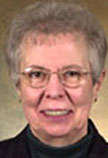 ” We trivialize our founders and our charism, if …” – Prophetic words – Sr. Gertrude Foley SC
” We trivialize our founders and our charism, if …” – Prophetic words – Sr. Gertrude Foley SC
It was almost 20 years ago at one of the first major gatherings of the Vincentian Family in the US that Sr. Gertrude Foley, SC offered the reflections below.
As we begin the year of Vincentian Family Collaboration they ring perhaps even more true today than when I first heard them in what is now Carnesecca Arena on the campus of St. John’s University in 1997. Some 200 people representing about 11 or 12 branches of the Vincentian Family gathered in what today might be called a kind of “getting to know you” session which was keynoted by Sr. Gertrude Foley, SC
Three quotes to wake us up..
Quoting Robert Maloney she writes of the exciting potential for networking… and the enormity of the challenge.
“What a powerful force we could have by networking the various branches of the Vincentian Family, and those ‘infected’ by the Vincentian spirit! What a tremendous impact we could have on the lives of the poor.” The thought of networking is exciting. The potential synergy of the gifts and talents of just the people gathered in this room inspires hope and awe.
We ask what impact we could have on the lives of the poor, and we have a resource that Vincent and Louise and Elizabeth and Frederick did not have. We have the potential of a “world wide web,” not of electronic media but of men and women already aware, organized, equipped, and involved in service to the poor of our times.
With a note of realism she added…
Nevertheless, we share something of our founders’ experience: the questions, the doubts, the temptations to despair as they faced the enormity of this challenge.
She asked what is the secret of our charism.
The charism that we share has many wonderful characteristics: organization, practicality, flexibility and adaptability. This apostolic tradition is holistic in its emphasis on both physical and spiritual as sistance. It is collaborative and parish-based. Wonderful as all these gifts are, and our founders model all of them, these gifts are not the secret to their impact on the history of the poor.
She points to our founders inner source of strength…
I think that we trivialize our charism and tradition, if we limit it to mean only works of service. Unless we are as passionate as our founders were, to grow daily into this identification with Jesus and his mission, we cannot claim the name Vincentian. We can exhaust our selves in implementing our strategies to serve the poor. But as Vincentians we will fail, if we do not contextualize all of our service in the three-way identification seen so clearly by our founders: the trinitarian relationship, if you will, among Jesus, the poor person, and the servant of the poor. We take certain pride (holy, I hope) in the practical, down-to-earth quality of our charism and tradition. That is true enough. Nevertheless, the grounding insight of our founders was mystical, powerful and empowering. This was the insight that answered their questions, allayed their doubts, and strengthened them when the testing came.
She offers the key to moving between the poles of euphoria and despair.
We must not separate in our thinking the exciting potential of networking on behalf of the poor and the formidable dimensions of the work to be done. If we separate these two factors, we will continually bounce between the poles of euphoria and despair. If, on the other hand, we keep these two factors connected, they will nudge us into asking more and different questions. Certainly, we will ask how can we make a network happen, given the awareness, commitment, experience and expertise of the people in this gathering?
However, we will go on to ask how it is possible to look without despair at the seemingly endless destructive potential of poverty, at its intractable evil? How is it possible never to give up on projects and programs that seem to be such weak attacks on such a powerful evil, efforts that seem so ineffective in the long run? How can we avoid using our concern for the poor merely to assuage our personal sense of powerless guilt? How can we stay in solidarity with the poor, without wasting our energy in justifiable but fruitless rage?
Our founders invented new ways to deal with what they found.
Standing in the empowering freedom of their insight into the nature of God, our founders found it possible to look without despair at the seemingly endless destructive potential of poverty, at its intractable evil. They found it possible to be equally intractable in their efforts, never giving up on projects and programs that seemed to be such weak attacks on such an evil, efforts that seemed so ineffective in the long run. They felt empowered and responsible in putting on the mission of Jesus, rather than powerless and guilty in the face of what have always looked like overwhelming odds. They followed Jesus who gave the phrase, “solidarity with the poor” its original meaning. They did not waste their energy in fruitless rage against what was unjust in their society. Instead, with intrepid, courageous love, a love that was effective not merely affective, they calmly invented new ways to address the urgency of need that they saw all around them.
The full text is worth reading and praying over.
Love – Inventive to Infinity GERTRUDE FOLEY, s.c.
First Presented April 19, 1997 Saint John’s University, New York








0 Comments